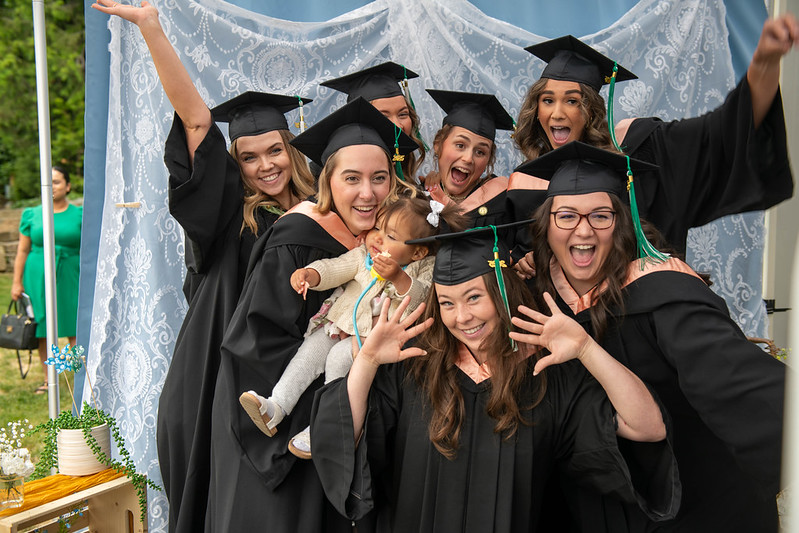Passion for writing paid off for Schroeder — honorary degree 2002
Honorary degree — Andreas Schroeder
Passion for writing paid off for Schroeder
The odds were not stacked in favour of Andreas Schroeder becoming a writer, much less a successful one who could support himself and a family by working with words.
Schroeder, who received an honorary doctorate of letters degree from UCFV this year, came from a Mennonite family that immigrated to the Fraser Valley in the early 1950s.
 |
|
Andreas Schroeder is congratulated by UCFV |
“Books were not that big a deal in my family as I was growing up. My father was against me becoming a writer, and the Mennonite community wasn’t thrilled with the idea,” recalls Andreas. “In fact, the Low German word for writer includes the connotation of liar and rascal.”
But there was a spark within him that couldn’t be extinguished.
“For as long as I can remember, I’ve loved to read. As a boy, I was given a storybook for Christmas that had blank pages because of a printing fluke,” he says. “I took that as an invitation to write my own novel. I’ve been passionate about writing right from scratch.”
Moving with his family into Vancouver from Agassiz at the age of 14 opened new doors for Andreas.
“I found my own community of artistic types there, moving from the Mennonite womb to a more secular world. At that point, I knew precious little about the life of a writer. In any other field, I would have been laughed out of town. But writers put up with idiosyncrasies and stupid behavior. My fellow writers made me feel welcome and allowed me to get rolling.”
He studied creative writing at UBC, earning a bachelor’s and master’s degree. He then embarked on a prolific writing career. Three decades after earning his MA, he has published 17 books, including fiction, non-fiction, translation, and poetry.
One of his most famous works is Shaking it Rough, a prison memoir he wrote after spending eight months in a B.C. prison on a minor narcotics charge. In recent years, Andreas has gained a national reputation for both his investigative talents and his wit, appearing regularly on Arthur Black’s national CBC radio show. His fascinating tales of colourful, nefarious figures of history have been collected in three books, the latest being Fakes, Frauds, and Flimflammery.
|
“For as long as I can remember, I’ve loved to read…. and I’ve been passionate about writing right from scratch.” |
He has also written a history of Mennonites in Canada, and a history of Mission.
Andreas is currently head of the creative writing program at the University of B.C., where he holds the Maclean-Hunter chair in creative non-fiction. He has had connections with UCFV over the years, teaching continuing education courses and delivering guest lectures to English classes.
He also returned to the Fraser Valley, spending 27 years living on a hill top in Mission with his wife and two daughters. Although they moved three years ago to the Sunshine Coast, the Valley still forms a large part of his identity.
“You can haul your body somewhere else, but part of you remains behind,” he notes. “I’ve spent 80 percent of my life in the Fraser Valley, between moving from Abbotsford to Rosedale to Agassiz as a youth and spending my adult years in Mission.”
Schroeder was one of the first generation of writers to emerge from the Mennonite community in Canada.
“For 600 years, there were no Mennonite writers to speak of. There must have been people who wanted to but were squelched. Now there are so many you could throw a rock at one and hit three more!”
And although his father never figured out how you could feed a family as a writer, most of the Mennonites have come to recognize him as a success in his chosen field.
He feels very fortunate to have fallen into a set of circumstances that allowed him to pursue his passion.
“I was lucky enough to be in a generation where the centralist control of the church opened up a bit, to have come to Canada where the legal structure promotes personal freedom, and to have been a part of the first generation of Canadian writers that didn’t have to leave the country to succeed.”
As for receiving an honorary degree, he’s pleased to be recognized by the post-secondary institution in the valley that has been such a big part of his life.
“I’m not sure that I deserve this, but I’m really pleased, and I’ll take it!”




